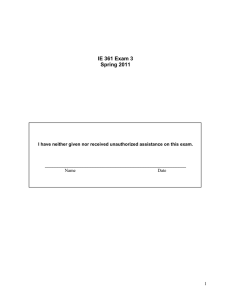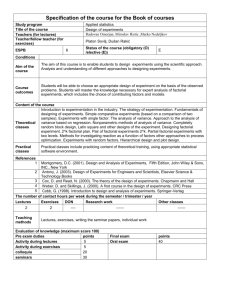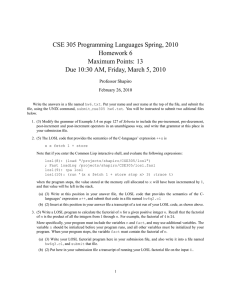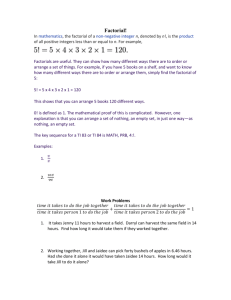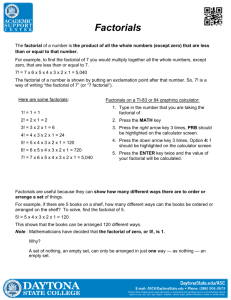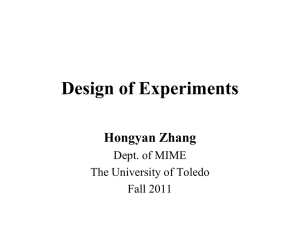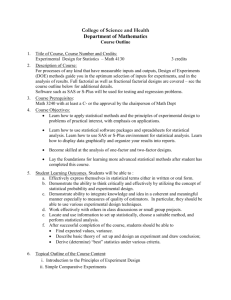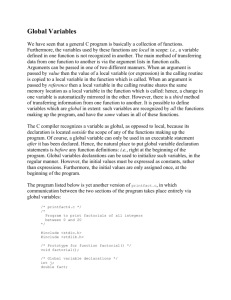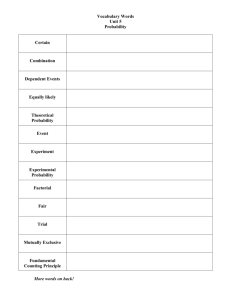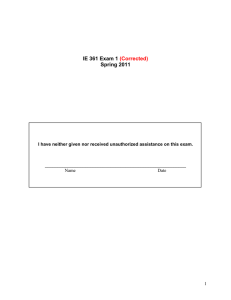Document 10779929
advertisement
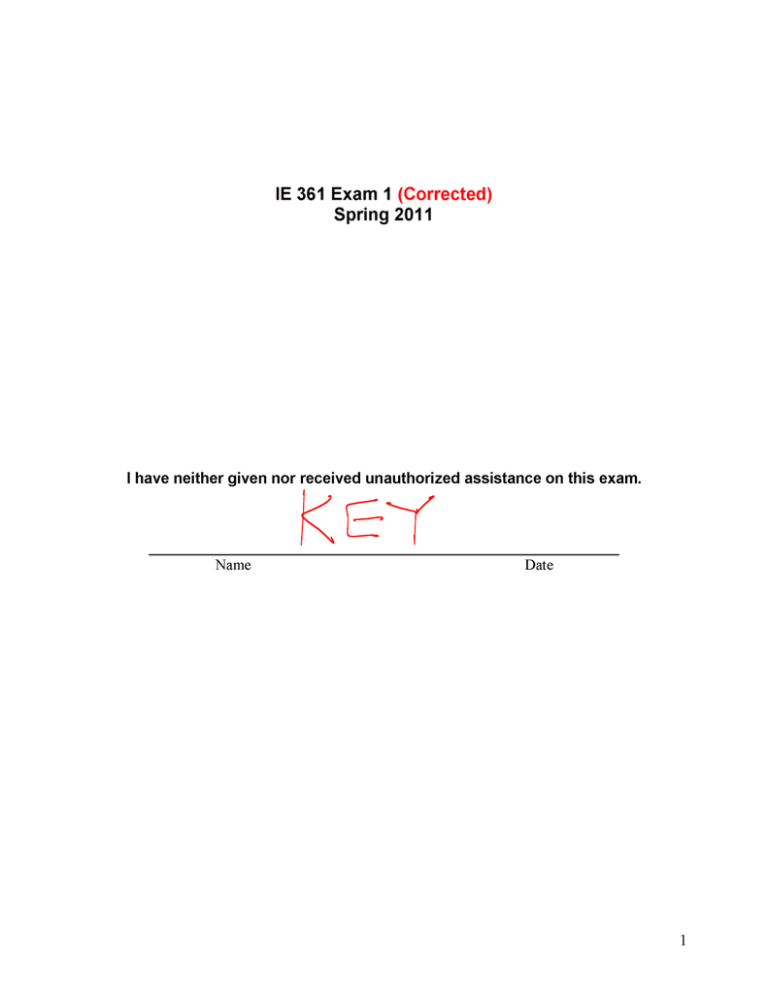
IE 361 Exam 2 Spring 2011 I have neither given nor received unauthorized assistance on this exam. ________________________________________________________ Name Date 1 Below are 25 True-False Questions, worth 2 points each. Write one of "T" or "F" in front of each. _____ 1. The percent impurity in one fluid ounce of a liquid product is tested and plotted once per hour in a production facility. The appropriate control chart limits are p chart limits. _____ 2. A mean number of non-conformities per unit plotted on Shewhart control chart can exceed 1.0. _____ 3. The upper standards given control limit for ranges increases as the sample size increases. _____ 4. The upper standards given control limit for standard deviations increases as the sample size increases. _____ 5. Upper and lower standards given control limits for fractions non-conforming get further apart as the sample size increases. _____ 6. A point plotting outside of control limits on a Shewhart chart always suggests process degradation. _____ 7. A standard " " used in setting x chart control limits represents only "process" variation. _____ 8. Engineering specifications on dimension A are 1.00 ' .02 ' , while specifications on dimension B are 1.00 ' .01' . Then samples of size n 5 must produce x chart control limits that are tighter for dimension B than for dimension A. _____ 9. Engineering feedback control can play a part in establishing industrial process stability that is then monitored using statistical process control. _____ 10. "Special cause variation" is another name for "process change" that Shewhart control charting is meant to detect. _____ 11. Retrospective control limits are meant to help answer the question "Are process parameters at their standard values?" _____ 12. Statistical tolerance limits are intended to indicate the requirements on a measurement in order for a corresponding item to be functional. _____ 13. Statistical prediction limits are intended to locate most of the future output of a stable process based on a sample from that process. _____ 14. C pk is a measure of present process performance (rather than process potential). _____ 15. If a 95% confidence interval for C pk is 1.5,1.7 then it is reasonably clear that a "6 sigma" process performance goal has been achieved. 2 _____ 16. The ARL concept is a tool for aiding the choice/design of a process monitoring scheme, in that it is a quantification of monitoring scheme performance under a particular model of process behavior. _____ 17. The "Western Electric Alarm Rules" are meant to provide the ability to quickly detect non-random patterns on a Shewhart chart. _____ 18. Tool wear in a turning process that would naturally make consecutively machined cylinders increase in size can potentially be compensated for by the use of engineering feedback control. _____ 19. A physically stable process will of necessity produce acceptable product. _____ 20. Trends on an individuals chart tend to make the corresponding value of MR /1.128 "too small" as an estimate of " ". _____ 21. Two different machining centers produce supposedly identical cylinders. A consistent difference between those machines (in terms of diameters produced) if ignored would produce "sample" averages of two diameters from each machine that would tend to look "too/unbelievably stable." _____ 22. Samples (or rational subgroups) of size n 1 make completely reliable estimation of impossible. _____ 23. If a process has a number of known "knobs" that can be used to change an output variable, y , establishing a level of "baseline" variation for y might be done by holding those fixed and control charting process output. _____ 24. Lack of physical stability means that basic changes to process configuration or operation are necessary in order to reduce observed variation. _____ 25. Normal plotting and confirmation a normal distributional shape are necessary before it is possible to make any form of statistical prediction limits. The next 5 pages each have a 10 point "work out" problem on them (numbered W1, W2,W3,W4, and W5.). Answer all 5. 3 W1. Below are some means and standard deviations for samples of size n 3 surface roughness measurements (units are -inches ). Sample x 1 19.4 2 19.2 3 21.1 4 19.8 5 19.9 6 19.6 7 20.3 8 19.7 9 18.7 10 20.1 s .3 1.5 2.0 1.6 1.8 1.3 .9 1.2 .7 .9 x 197.8 s 12.2 Suppose that process standards are 20 and 1 . Is there evidence of change from these standard values in these data? Show appropriate calculations and explicitly say whether there is any evidence of change from the process standard values. Evidence of change from standard values? (Circle the correct response.) In means? yes/no In standard deviations? yes/no 4 W2. Below are numbers of radiators inspected and total leaks found in those inspections over a number of 1 hour periods. Period Leaks Number Inspected 1 2 2 0 3 1 4 1 5 2 6 1 7 0 8 6 9 0 10 3 Leaks 16 2 1 2 1 3 3 2 1 2 3 Total 20 Determine whether there is any evidence of process instability in these data. Show appropriate calculations and say clearly where (if at all) there is evidence of instability. 5 W3. Below is a JMP report for n 25 measured weld strengths (units are psi). a) Why is consideration of the kind of plot shown here wise before considering process capability measures? b) Specifications on such strengths are 1100 psi to 1800 psi. Give 95% confidence limits for C pk . 6 W4. Suppose that a pelletizing process is physically stable, producing constant fraction nonconforming p . Samples of size n 100 are used to do Shewhart control charting with standard value p .2 . a) What is the ARL if p is at its standard value? b) What is the ARL if p is twice its standard value? 7 W5. Below is an artificial series of observations (samples of size n 1 ) collected from consecutive items (suppose the units are inches). 2,4,6,8,10,12,14,16,18,20 a) How does the best available estimate of " " here (based on control charting ideas) compare to the sample standard deviation? Provide some rationale why the larger of these is larger. b) Set up control limits for future monitoring of individual measurements of this type using a process mean of 10 and an appropriate estimate of process standard deviation. 8 IE 361 Exam 3 Spring 2011 I have neither given nor received unauthorized assistance on this exam. ________________________________________________________ Name Date 1 Below are 25 True-False Questions, worth 2 points each. Write one of "T" or "F" in front of each. _____ 1. Simulation and "statistical tolerancing" are both methods that can be used to approximate the standard deviation of a function of several random variables. _____ 2. "Statistical tolerancing" is more a data analysis tool than it is a "design" or "what if" tool. _____ 3. If a system input is highly variable, then the system output will of necessity be highly variable. _____ 4. If a system is highly sensitive to variation in one input, then the system output will of necessity be highly variable. _____ 5. Without replication in an experiment, there is no solid basis upon which to establish the level of background noise against which observed changes in response experimentalcondition-to-experimental-condition can be judged. _____ 6. Replication in an experiment requires that every set of experimental conditions be "run" the same number of times, producing balanced data. _____ 7. spooled is meant to measure variability in response y for any fixed set of experimental conditions. _____ 8. If s1 2.0, s2 1.5, s3 5.1, and s4 3.4 , then it is impossible that spooled .4 . _____ 9. Rough/approximate 95% "margins of error" for sample means ( yi ) in an r -sample study are 2 spooled . _____ 10. In a balanced data study, margins of error for a difference in two means yi twice those for a single mean yi . yi are _____ 11. Large sample sizes in experiments improve one's ability to estimate basic experimental variation, but do not much help improve the precision with which main effects and interactions are known. _____ 12. An experimental effect is statistically detectable exactly when it is of realworld/practical importance. _____ 13. One reason to consider the making of margins of error for linear combinations of sample means from an experiment, is that in factorial studies fitted main effects and interactions are such linear combinations. _____ 14. A fitted "A" main effect in a factorial study compares the average mean response at a fixed level of the factor with the overall average mean response. 2 _____ 15. The difference between two fitted "A" main effects in a factorial study is the difference between the two corresponding average sample means. _____ 16. The presence of important interactions in a two-way factorial study means that it is possible to make blanket statements about the impact of a change in level of Factor A that will hold true across all levels of Factor B. _____ 17. Fitted two-factor interactions in a two-way factorial study measure the difference between what is true about the response and what can be accounted for by considering the impact of the factors acting separately/individually on the response. _____ 18. Three-way interactions in a three-way factorial measure the difference between what one would call A B two-factor interactions looking separately at mean responses on the various levels of Factor C. _____ 19. Results of 2 p factorial experiments are most easily interpreted when p -way interactions are important and statistically detectable. _____ 20. All of the values produced by the Yates algorithm have the same associated margin of error. For questions 21-25: In a particular 27 F CD , and G ABCD are used. 3 fractional factorial experiment, generators E AB , 1 th of all 128 possible combinations of tow levels of each of factors 8 A,B,C,D,E,F, and G are run. _____ 21. In this study, _____ 22. The results of such an experiment will typically provide the same amount of information about the effects of Factors A,B,C,D,E,F, and G as would a full 27 factorial study. _____ 23. In this study every 27 factorial effect has 7 "aliases." (Every 27 factorial effect is indistinguishable from 7 other 27 factorial effects.) _____ 24. One combination of levels of the 7 factors included in the study is the combination abcd. _____ 25. In this study, the E main effects are aliased with F G two-factor interactions. The next 5 pages each have a 10 point "work out" problem on them (numbered W1, W2,W3,W4, and W5.). Answer all 5. 3 W1. A plate with two circular holes in it must fit over 2 round pegs. The sketch below illustrates the situation. Pegs of radii r1 and r2 mm are placed d1 mm apart. The holes of radii r3 and r4 are placed d 2 mm apart. The plate will fit over the pegs provided 0 r3 r4 d 2 r1 r2 d1 and 0 d1 r1 r2 d 2 r3 r4 So, for example, the variable c d1 d 2 r1 r2 r3 r4 is of interest. Suppose that means and standard deviations of the dimensions here are as follows. Variable d1 20 mm 1 mm d2 20 mm 1 mm r1 , r2 6 mm .1 mm r3 , r4 7 mm .1 mm Assuming the dimensions are independent, find the mean ( c ___________ c c ) and standard deviation ( c ) for c . __________ 4 W2. Some so-called "tilttable tests" were done to compare angles at which vehicles experience liftoff of "high side" wheels and begin to roll over. Tests on r 3 vans produced tangents of angles ("tilttable ratios") at which lift-off occurs summarized below. (Plug in completely, but you need not simplify.) Van #1 n1 4 y1 1.093 Van #2 n2 5 y2 .968 Van #3 n3 3 y3 1.020 s1 s2 s2 .002 .003 .004 Van #1 was a minivan, and Vans #2 and #3 were full-sized vans. A linear combination of means that could be used to compare the minivan to the two full-sized vans is 1 L 1 2 3 2 Find 95% confidence limits for this quantity. 5 W3. Below are some summary statistics from a class project concerning stopping distances of a bicycle with smooth and reverse tread tires on dry and wet concrete. Lengths of m 6 skids marks were measured under each set of conditions and processed to produce the values below. (Units are cm.) Smooth Tires Reverse Tread Tires y11 Dry Concrete 360 and s11 19 y12 Wet Concrete 367 and s12 26 y21 343 and s21 16 y22 357 and s22 37 Using 95% confidence limits find a margin of error to associate with each sample mean in the table. Do some appropriate plotting below, and based on the plot and your margin of error say whether (and WHY) you think that Tire by Surface interactions are statistically detectable. 6 W4. A 23 factorial study with four sample sizes of 2 and four sample sizes of 1 produces spooled 1.5 and the hypothetical sample means below. comb y (1) 10 a 13 b 8 ab 11 c 16 ac 5 bc 14 abc 3 Which (if any) factorial effects are statistically detectable (based on 95% confidence limits for effects)? 7 W5. A 1 8 th fraction of a 27 factorial has defining relation I ABE CDF ABCDG ABCDEF CDEG ABFG EFG Suppose that (initially ignoring levels of factors E,F, and G) one does data analysis that leads to the conclusion that important effects are AB interaction aliases CD interaction aliases ABCD interaction aliases Give then 2 simple plausible interpretations of this outcome in terms of all 7 factors A,B,C,D,E,F, and G? (Which of the 27 factorial effect are potentially important? Consider only interpretations involving main effects or possibly main effects and associated interactions.) Possible interpretation #1: Possible interpretation#2: 8
